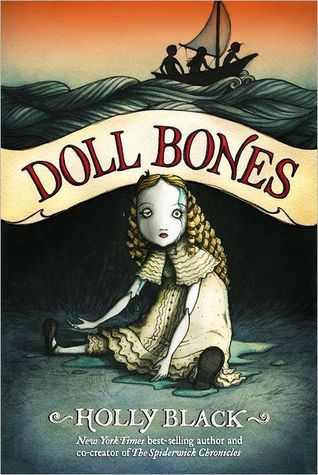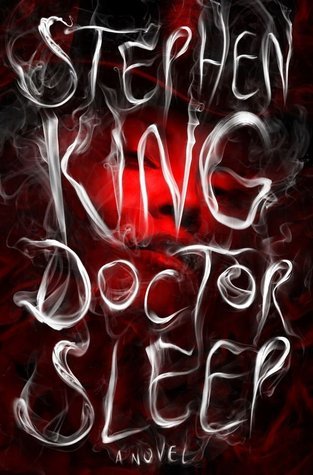Book Review: Doll Bones, by Holly Black
 Synopsis from Goodreads:
Synopsis from Goodreads:
Zach, Poppy and Alice have been friends for ever. They love playing with their action figure toys, imagining a magical world of adventure and heroism. But disaster strikes when, without warning, Zach’s father throws out all his toys, declaring he’s too old for them. Zach is furious, confused and embarrassed, deciding that the only way to cope is to stop playing…and stop being friends with Poppy and Alice. But one night the girls pay Zach a visit, and tell him about a series of mysterious occurrences. Poppy swears that she is now being haunted by a china doll – who claims that it is made from the ground-up bones of a murdered girl. They must return the doll to where the girl lived, and bury it. Otherwise the three children will be cursed for eternity…
I picked this one up after reading this review. I promised the blogger who wrote it that I would eventually get around to writing my own. This is the result.
As I always do when I review a book, I like to point out both the positives and the negatives, because I believe that even a good book isn’t perfect, and because I like to present a balanced and thorough analysis.
Let’s start with what this book does right.
For one thing, it’s gorgeously written. Black has a gift for turning a phrase. The words she uses and the way she uses them frequently take my breath away. Occasionally, Black peppers her language with words that are a little complex for a middle grader, words like kleptomaniacal. I think this is a good thing. It’s not heavy handed, but comes up in the text organically, and it forces kids to do some research and to build their vocabulary.
Black does a remarkable job of describing the roleplaying of Zach, Alice and Poppy from their perspective, and of elevating mere child’s play to an elaborate ongoing act of talented and inspired storytelling. Just as in reality, the two in Doll Bones are one in the same.
True to Black’s other work, Doll Bones deals with dark themes like death and supernatural angst. But it does so in a way that remains accessible and palatable for children. This is important, because while we must allow children to face and learn how to cope with the consequences of life in a broken world, we must also tread lightly and be very careful not to unduly frighten and depress them.
Dysfunctional family life is a central theme, and serves as a backbone in the development of the book’s main characters. Poppy’s parents have thrown their arms up and decided to let their kids do whatever they want. Zach’s dad selfishly left him and his mother to make a living for himself, only to barge back in on them when it didn’t work out, just as they were adjusting to life without him. Alice is being raised by an overly strict grandmother, who won’t allow her to do most of the things an ordinary child in junior high should be allowed to do. The various dysfunctional dynamics of these three families are all too common in today’s world, and are undoubtedly relatable to many of this book’s readers.
Black captures beautifully the inevitable and often painful realities of growing up. Zach’s ever-growing discomfort over his playing with action figures at an age where such things are frowned upon by his peers is something that both children and adults can identify with, as well as his father’s misguided attempt to help him “grow up” by throwing his action figures away. There’s also a very tangible (and sometimes painfully awkward) tension that arises between Zach and the girls now that they’ve grown to an age where they begin to notice each other in new and different ways. This tension comes to a head about two thirds or three quarters of the way through the book, and adds a nice sub-plot to the story.
The “epic quest” that the children undertake is as much a product of their ongoing fantasies as it is about laying the doll to rest. In fact, more than once, Poppy’s veracity concerning the spirit of the doll is called into question, yet they choose to press on even in the face of extreme difficulty. The lure of an adventure, however risky and terrifying, simply proves to be irresistible.
Now, what about Doll Bones don’t I like?
For one, the plot suffers from too many implausible scenarios. At the beginning of their quest, Zach, Alice and Poppy board a late night bus. I would, at the very least, expect the driver to ask them how old they are. But he says nothing, and the children are allowed to go on their merry way. Later, desperate to cross a river so they can complete their quest and give the doll a proper burial, they steal a dinghy. Miraculously, Zach is able to sail it, despite the fact that he’s had no prior training, and that his only knowledge of sail boats comes from books. When it eventually capsizes in the presence of a barge, nobody on the other boat stops to ask if they need help, despite the fact that they can clearly see there are children on board.
I’m also put off by how abruptly the story ends. As a reader, I feel a little cheated. Some lingering mystery can be a powerful thing, but there are too many loose threads that should have been tied up. To be fair, it’s a difficult tale to conclude properly. Without giving away the ending, it’s clear as we reach the final pages that the kids have gotten themselves in pretty deep; some extremely skillful cleanup would be required to pull it off successfully. I think ultimately, the task proved too difficult, and that Black chose to end the story a little early instead.
Overall, this book is well worth the investment. It’s beautifully written, mysterious and true to life. It successfully handles a dark theme with the delicate care required for children’s literature. Though it isn’t perfect, I would definitely say that the good outweighs the bad, and would, without question, recommend it for both children and adults.
Enter your email address and click "Submit" to subscribe and receive The Sign.
